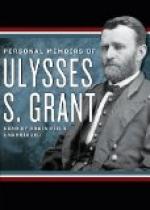Anderson soon intrenched himself—if indeed the intrenchments were not already made—immediately across Warren’s front. Warren was not aware of his presence, but probably supposed it was the cavalry which Merritt had engaged earlier in the day. He assaulted at once, but was repulsed. He soon organized his men, as they were not pursued by the enemy, and made a second attack, this time with his whole corps. This time he succeeded in gaining a position immediately in the enemy’s front, where he intrenched. His right and left divisions—the former Crawford’s, the latter Wadsworth’s, now commanded by Cutler—drove the enemy back some distance.
At this time my headquarters had been advanced to Piney Branch Church. I was anxious to crush Anderson before Lee could get a force to his support. To this end Sedgwick who was at Piney Branch Church, was ordered to Warren’s support. Hancock, who was at Todd’s Tavern, was notified of Warren’s engagement, and was directed to be in readiness to come up. Burnside, who was with the wagon trains at Aldrich’s on our extreme left, received the same instructions. Sedgwick was slow in getting up for some reason—probably unavoidable, because he was never at fault when serious work was to be done—so that it was near night before the combined forces were ready to attack. Even then all of Sedgwick’s command did not get into the engagement. Warren led the last assault, one division at a time, and of course it failed.
Warren’s difficulty was twofold: when he received an order to do anything, it would at once occur to his mind how all the balance of the army should be engaged so as properly to co-operate with him. His ideas were generally good, but he would forget that the person giving him orders had thought of others at the time he had of him. In like manner, when he did get ready to execute an order, after giving most intelligent instructions to division commanders, he would go in with one division, holding the others in reserve until he could superintend their movements in person also, forgetting that division commanders could execute an order without his presence. His difficulty was constitutional and beyond his control. He was an officer of superior ability, quick perceptions, and personal courage to accomplish anything that could be done with a small command.
Lee had ordered Hill’s corps—now commanded by Early—to move by the very road we had marched upon. This shows that even early in the morning of the 8th Lee had not yet become acquainted with my move, but still thought that the Army of the Potomac had gone to Fredericksburg. Indeed, he informed the authorities at Richmond he had possession of Spottsylvania and was on my flank. Anderson was in possession of Spottsylvania, through no foresight of Lee, however. Early only found that he had been following us when he ran against Hancock at Todd’s Tavern. His coming detained Hancock from the battle-field of Spottsylvania for that day; but he, in like manner, kept Early back and forced him to move by another route.




